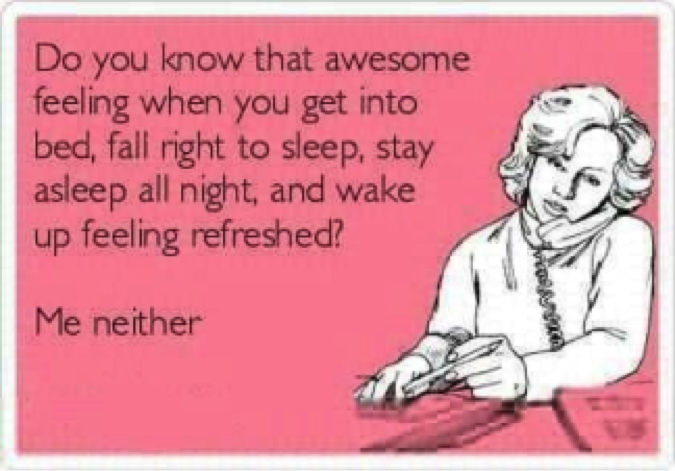
 If you smiled or chuckled reading the above meme then this blog is for you.
When was the last time you had an entire month of really good sleep? Here is a scarier question: “When was the last time you had a full week of great sleep without being on vacation?”
If you smiled or chuckled reading the above meme then this blog is for you.
When was the last time you had an entire month of really good sleep? Here is a scarier question: “When was the last time you had a full week of great sleep without being on vacation?”
What about your team? Are they getting enough sleep? If they are not, you may want to encourage them to.
Sleep could be the number one productivity tool.
According to health.com:
Sleep:
- Improves memory
- Extends life
- Curbs inflammation (reduces chance of heart disease, stroke, diabetes, etc.)
- Spurs creativity
- Increases winning
- Improves job performance
- Sharpens attention
- Facilitates losing more fat
- Lowers stress
- Reduces accidents
- Lowers chances of becoming depressed
We absolutely need a full night of sleep if we expect our memory, creativity and stress levels to be in an optimal range to bring out our best.
I used to sleep only 4-6 hours per night, but after switching to 7-8 hours consistently for a month, the difference in my life has been tremendous. I've found that I:
- Am happier
- Feel more confident
- Get much more done in less time
- Listen better
- Feel alive and engaged
- Function with far less stress
- Am able to read people better
- Etc.
I wish I could say that I ALWAYS get great sleep. There are plenty of times that I wake up at 2am or 3am and can’t fall back asleep. But I am learning tips (see below) to help me fall back asleep.
Try some of the following techniques and let me know if they help:
1. Create a sleep ready room.
Sleep is serious business. Turn your bedroom into a sleep-ready room. For me that means:
- A really cool room (we turn down the temperature at our house)
- A warm blanket
- A fan blowing on me (my wife can’t stand a fan on her but for me it is just the right amount of noise to help me fall asleep fast)
- Heavy drapes that eliminate light in the room
- The right setting on my Sleep Number bed
- Not having any visible clocks in the room (see below for why)
Think of times when you had really great sleep. What did those times have in common? Include those commonalities in your sleep ready room.
2. Workout four hours before you want to fall asleep.
If you are like me, you might not have much problem falling asleep, but you may wake up at 2am or 3am and not be able to fall back asleep.
Studies have shown that if you want to stay asleep longer you should do a strenuous workout about four hours before you want to fall asleep. For many this has not only increased the amount that they sleep, but it has improved the quality of their sleep.
3. No screens, including TV, for 2-3 hours before you want to fall asleep.
Study after study has shown that the light created from laptops, tablets, smartphones, TV, etc. detracts from our ability to sleep.
4. Develop a bedtime routine.
If you set up a thirty-minute bedtime routine and you repeatedly follow it, don’t be surprised if, as you start the bedtime routine, you start to get really sleepy.
The body can be trained to fall asleep fast.
5. If you are struggling to fall asleep quickly, read about this weird breathing technique that helps many to fall asleep within 60 seconds.
6. If you wake up in the middle of the night, don’t look at your clock.
Sometimes when we look at our clocks, we worry about whether or not we will fall asleep, or if it is closer to morning, we can decide not to fall asleep and miss some really needed sleep.
If I let time rule me, I get far less sleep than necessary.
Here is a radical thought. Don't have a clock that is visible in the middle of the night so you can avoid seeing the time.
7. No matter what, if you wake up in the middle of the night, don’t look at a screen.
I love tennis. Sometimes when the tennis season moves to Asia (like it is right now), I am extremely tempted to see if favorite players like Rafael Nadal and Venus Williams won their matches.
If I see that they have won, I feel excited and happy, which means my heart beats faster and I find it hard to fall asleep.
If they have lost, I feel down and that, too, can keep me up longer than I’d like.
If they are in the middle of their matches, well, of course I want to cheer them on. So I'm tempted to stream the match. So that is not good either.
It is much easier to eliminate the temptation by not even looking at my smartphone if I wake up early.
Plus, as stated above, my sleep is not hindered by the screen’s light.
I really hope you discover what it is like to consistently get great sleep. If you have other tips that would help increase the chances of consistently getting great sleep, I would love to know.
Chew On This:
- What will you do to encourage you and your team to prioritize sleep?
Ryan C. Bailey is an Executive Coach who helps business leaders develop in-demand high performing teams.
